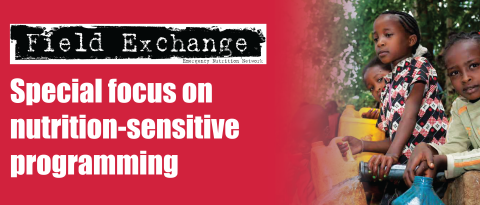SUN experiences: lessons from Pakistan
By Muhammad Aslam Shaheen and Dr. Ali Ahmad Khan
Muhammad Aslam Shaheen is Chief of Nutrition at the Ministry of Planning Development & Reform, Pakistan and is the SUN Focal Point in Pakistan.
Dr. Ali Ahmad Khan is the Programme Officer for the SUN Secretariat, Ministry of Planning Development & Reform, Pakistan
The authors would like to acknowledge the Minister for Planning Development and Reform (MPDR), Government of Pakistan, for his support to the cause of nutrition along with the Secretary of the MPDR. Moreover, thanks are extended to the SUN core group members in Pakistan, including UN members (WFP, UNICEF, FAO, WHO); donors (World Bank, DFID, DFATD, EU, etc.); and civil society (Micronutrient Initiative, GAIN etc.). We would also like to acknowledge the continued support of the Global SUN Movement Secretariat to Pakistan, especially Dr. Alam Khattak and colleagues.
Location: Pakistan
What we know: Pakistan joined the SUN Movement in April 2013 with the country launch on 16 December 2013.
What this article adds: Nutrition-specific/sensitive programme budget analysis of government expenditure was performed for the first time in 2014-15 (development funds are not yet captured in such an exercise). Since joining the SUN Movement, there has been stronger coordination between government and donors, UN agencies, business and other development partners. An academic and research network is also being formed. Devolution has added a complexity to coordination and harmonised plans that is being managed. Multi-sectoral planning has produced a national nutrition policy that is being costed. Priorities in Pakistan include monitoring the delivery of programmes under the national nutrition policy and action plan; maintaining political interest in nutrition; including non-public sector financing in budgetary analysis; and using nutrition-related budget utilisation as an overarching indicator of success.
Background
 On 26 January 2013, the Islamic Republic of Pakistan submitted an application to join the Scaling Up Nutrition (SUN) Movement with a letter of commitment from the Senior Chief Nutrition, Ministry of Planning Development & Reform/Planning Commission of Pakistan. In April 2013, Pakistan became the 34th country to become part of the global SUN Movement which was launched on 16 December 2013 with an official declaration. Joining the SUN Movement was partly a reaction to the alarming figures for malnutrition in the National Nutrition Survey (NNS) 2011 and in previous surveys (see Figure 1).
On 26 January 2013, the Islamic Republic of Pakistan submitted an application to join the Scaling Up Nutrition (SUN) Movement with a letter of commitment from the Senior Chief Nutrition, Ministry of Planning Development & Reform/Planning Commission of Pakistan. In April 2013, Pakistan became the 34th country to become part of the global SUN Movement which was launched on 16 December 2013 with an official declaration. Joining the SUN Movement was partly a reaction to the alarming figures for malnutrition in the National Nutrition Survey (NNS) 2011 and in previous surveys (see Figure 1).
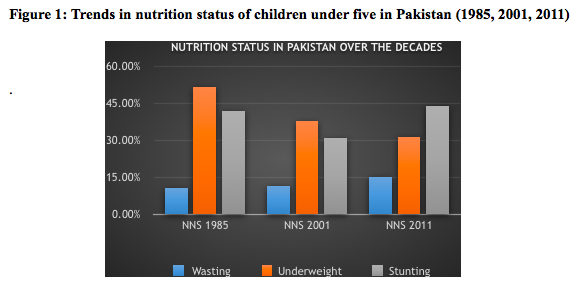
The SUN Movement in Pakistan is currently working under the direction of the apex institute in the country, the Planning Commission of Pakistan. The Planning Commission is the government body that regulates almost all programmes and proposals related to federal and provincial departments. All the planning documents are submitted to the Planning Commission, reviewed and if found feasible, are submitted further for approval. The Planning Commission has had to adjust to many new realities and challenges, including recognising and accommodating the roles of the private sector, civil society, media and information technology; the impact of globalisation (assessing how global events affect country policies and programmes, and suggesting actions to minimise the negative effects and maximise the positive ones); devolution; and the National Finance Commission award on economic policy, design and formulation.
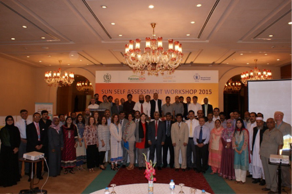 The Chief of Nutrition, Mr. Aslam Shaheen, is the SUN Focal Point for the country and deals with technical and operational matters related to the Movement. His efforts are in line with the Pakistan Vision 2025 (see www.pc.gov.pk/wp-content/uploads/2015/05/Pakistan-Vision-2025.pdf ) and guidance is provided by the Members, Secretary and Minister for the Ministry of Planning Development & Reform.
The Chief of Nutrition, Mr. Aslam Shaheen, is the SUN Focal Point for the country and deals with technical and operational matters related to the Movement. His efforts are in line with the Pakistan Vision 2025 (see www.pc.gov.pk/wp-content/uploads/2015/05/Pakistan-Vision-2025.pdf ) and guidance is provided by the Members, Secretary and Minister for the Ministry of Planning Development & Reform.
The SUN Core Group (or National Nutrition Committee (NNC), equivalent to the SUN multi-stakeholder platform) consists of key members of development partners and ministries who steer the process forward in the country. Members of the Core Group are:
- Ministry of Planning Development & Reform – Nutrition Section/SUN Secretariat;
- Ministry of National Health Services Regulation & Coordination – Nutrition Wing;
- Ministry of National Food Security & Research – Food Commissioners;
- WFP;
- WHO;
- UNICEF;
- FAO;
- World Bank;
- DFID;
- DFAT;
- European Union;
- Save the Children;
- Micronutrient Initiative (MI);
- Global Alliance for Improved Nutrition (GAIN); and
- Harvest Plus.
As outlined in the Global SUN Strategy, there are specific networks that have been formed for streamlined efforts to scale up nutrition in the country. At present, the networks that have been established are:
- SUN Government Network;
- SUN UN Network;
- SUN Donor Network;
- SUN Civil Society Alliance – CSO Network;
- SUN Business Network being finalised; and
- SUN Academia & Research Network.
In order to increase the potential for innovation and evidence-based interventions, Pakistan has proposed and established the SUN Academia & Research Network; such a network is not proposed in the Global SUN strategy. The idea of harnessing support from key parliamentary and media stakeholders is also under consideration in Pakistan, with the possibility of setting up a separate network for these actors.
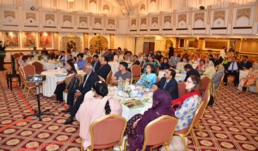 Pakistan has provinces in addition to states and areas that are under federal control. Devolution has taken place in the provinces only; the status of the states and areas under federal control remain the same. Each of the four devolved provinces has nominated the Chief of Health of the Provincial Planning and Development Departments (P&DD) as the provincial SUN Focal Point. These focal points, along with the provincial representatives of the Core Group members and members of the networks, coordinate their efforts for scaling up nutrition in-country. Provincial Inter-sectoral Steering Committees and Technical Working Groups work to operationalise the Provincial Policy Guidance Notes and provincial inter-sectoral nutrition strategies. In this way, the provinces, with support from the Federal Government, have their project concept documents (PC-1s) approved for nutrition. Two provinces have Nutrition PC-1s and the other two have Health Sector integrated reform PC-1s. These projects aim to combat malnutrition and related mortality and are implemented by provincial Departments of Health. Nutrition-specific projects in Sindh and Baluchistan include management of severe acute malnutrition (SAM), micronutrient supplementation, and behaviour change communication (BCC). In Punjab and Khyber Pakhtunkhwa (KP), nutrition-specific and nutrition-sensitive programming is reflected in Health Integrated Services projects, using an integrated approach with interventions such as the Lady Health Worker (LHW) programme, immunisation programmes, maternal, newborn and child health (MNCH), family planning and nutrition interventions. Programmes are costed and include nutrition indicators.
Pakistan has provinces in addition to states and areas that are under federal control. Devolution has taken place in the provinces only; the status of the states and areas under federal control remain the same. Each of the four devolved provinces has nominated the Chief of Health of the Provincial Planning and Development Departments (P&DD) as the provincial SUN Focal Point. These focal points, along with the provincial representatives of the Core Group members and members of the networks, coordinate their efforts for scaling up nutrition in-country. Provincial Inter-sectoral Steering Committees and Technical Working Groups work to operationalise the Provincial Policy Guidance Notes and provincial inter-sectoral nutrition strategies. In this way, the provinces, with support from the Federal Government, have their project concept documents (PC-1s) approved for nutrition. Two provinces have Nutrition PC-1s and the other two have Health Sector integrated reform PC-1s. These projects aim to combat malnutrition and related mortality and are implemented by provincial Departments of Health. Nutrition-specific projects in Sindh and Baluchistan include management of severe acute malnutrition (SAM), micronutrient supplementation, and behaviour change communication (BCC). In Punjab and Khyber Pakhtunkhwa (KP), nutrition-specific and nutrition-sensitive programming is reflected in Health Integrated Services projects, using an integrated approach with interventions such as the Lady Health Worker (LHW) programme, immunisation programmes, maternal, newborn and child health (MNCH), family planning and nutrition interventions. Programmes are costed and include nutrition indicators.
Nutrition-sensitive programming
What is it?
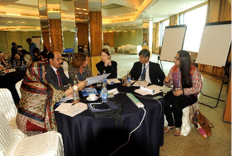 In Pakistan, nutrition-sensitive programming is defined in the same way as proposed in the Lancet 2013 nutrition series as: “interventions or programmes that address the underlying determinants of foetal and child nutrition and development, which include food security; adequate care-giving resources at the maternal, household and community levels; access to health services; and a safe and hygienic environment.” The following are the programmes/activities that are considered potentially nutrition-sensitive in Pakistan:
In Pakistan, nutrition-sensitive programming is defined in the same way as proposed in the Lancet 2013 nutrition series as: “interventions or programmes that address the underlying determinants of foetal and child nutrition and development, which include food security; adequate care-giving resources at the maternal, household and community levels; access to health services; and a safe and hygienic environment.” The following are the programmes/activities that are considered potentially nutrition-sensitive in Pakistan:
- Education
- Water
- Agriculture
- Health
- Planning and development
- Livestock and fisheries
- Social welfare
- Local government
- Women empowerment
- Industries
- Special programmes, e.g. income- generation and poverty-reduction projects
Finance and budgets
The Benazir Income Support Programme (BISP) is a Federal Government national programme allocation that provides a social safety net and contributes to national food and nutrition security. It is essentially cash support to vulnerable groups based on their poverty-scoring in the country. It is funded out of the federal Public Sector Development Programme (PSDP) budget, which entails all the programmes that are going to be funded and implemented by the Government of Pakistan. Through 2010 and 2011, devolution to provincial level has taken place. On devolution, the federal BISP and PSDP have continued, while provinces have also begun their own social welfare and safety-net programmes. BISP selection criteria include checks that avoid duplication. In this instance, the provinces receive more resources from the Federation according to set criteria determined by the National Finance Commission (NFC). This is an extensive formula which is agreed by all federating units, including population, needs, situation etc. In PSDP’s social sector programme, budgetary allocations have been reduced, whereas provinces have enhanced their nutrition-specific/sensitive allocations from the increased federal financial resources received according to the set criteria of NFC.
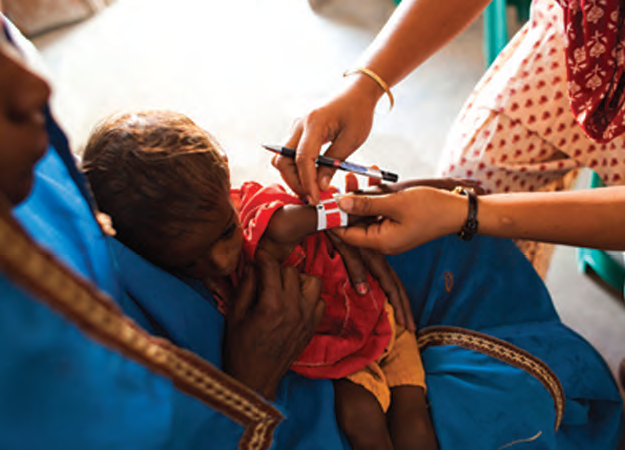 Nutrition-specific/sensitive programme budget analysis was performed (for the first time) following Pakistan’s joining of the SUN Movement in 2013. Table 1 reflects the federal financial allocation to the national PSDP and the BISP. This mostly reflects government spend; however some projects funded by donors (e.g. bilateral, trust funds) and development partners also have a grant/loan component to them. This budgetary analysis was performed according to the directions of the Global SUN Movement Secretariat (see Table 2) and were presented in the SUN Movement Financial Tracking Workshop held in Asia in early 2015. For 2015-16, there is specific budget allocation for Nutrition and the Sustainable Development Goals (SDGs), an additional tranche of funding. The budget allocation reflected in Table 1 is for federal government only; since devolution, the provincial governments allocate finance in their budgets separately which are not depicted in the PSDP or BISP. Funding that targets women is now devolved and integrated across sectors; federal government previously provided funding that allowed targeting of women, but now expect provinces to fund this out of their Annual Development Programme of provinces (ADP) allocation.
Nutrition-specific/sensitive programme budget analysis was performed (for the first time) following Pakistan’s joining of the SUN Movement in 2013. Table 1 reflects the federal financial allocation to the national PSDP and the BISP. This mostly reflects government spend; however some projects funded by donors (e.g. bilateral, trust funds) and development partners also have a grant/loan component to them. This budgetary analysis was performed according to the directions of the Global SUN Movement Secretariat (see Table 2) and were presented in the SUN Movement Financial Tracking Workshop held in Asia in early 2015. For 2015-16, there is specific budget allocation for Nutrition and the Sustainable Development Goals (SDGs), an additional tranche of funding. The budget allocation reflected in Table 1 is for federal government only; since devolution, the provincial governments allocate finance in their budgets separately which are not depicted in the PSDP or BISP. Funding that targets women is now devolved and integrated across sectors; federal government previously provided funding that allowed targeting of women, but now expect provinces to fund this out of their Annual Development Programme of provinces (ADP) allocation.
Table 3 includes detail on how the allocations were applied for various sectors at sub-national level for federally-controlled areas. This reflects how, overall, budgetary allocations for nutrition-sensitive programming increased between 2013-14 and 2014-15. The BISP is a federal allocation that provides a social safety net and contributes to food and nutrition security. It is funded out of the federal PSDP budget but is presented separately to the PSDP federal-level spend in Table 3. The total allocation for 2015-16 is 1,020 billion PKR. The BISP is considered 25% nutrition-sensitive (as reflected in Table 2). The programme is 100% funded by the Federal Government as a national programme.
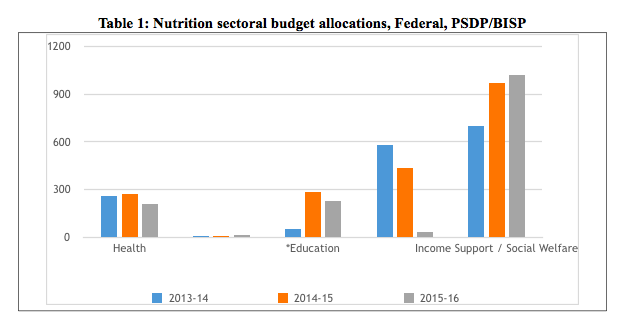
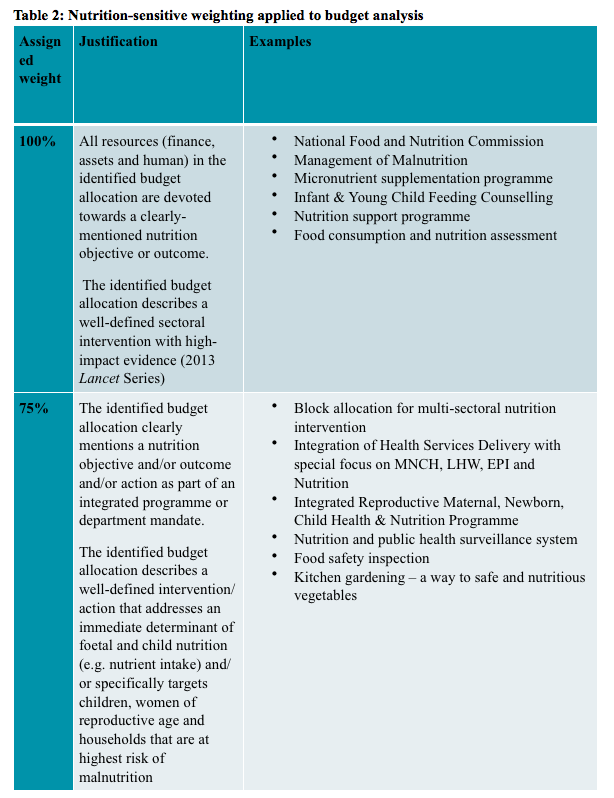
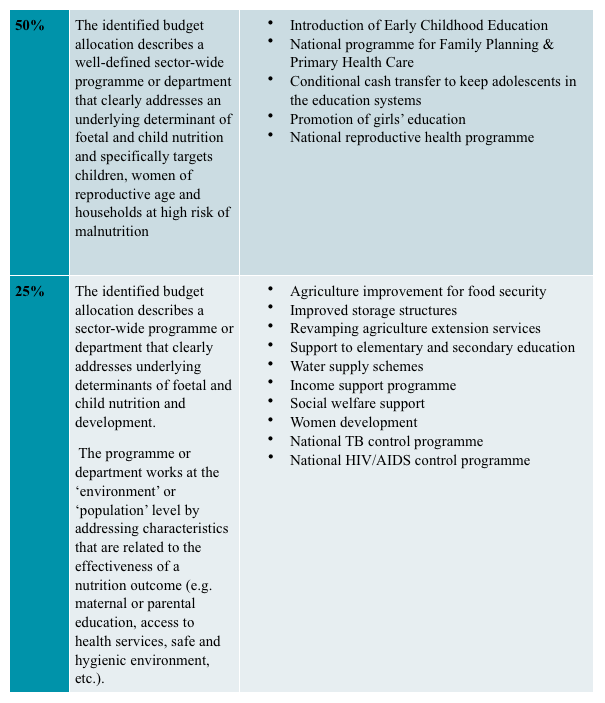
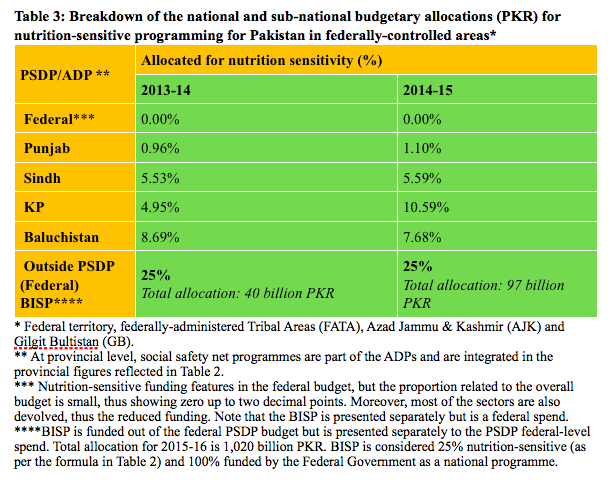 Added value of the SUN Movement in Pakistan
Added value of the SUN Movement in Pakistan
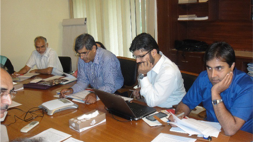 Since Pakistan joined the SUN Movement, there has been increased coordination between the donors, UN agencies and other development partners with government. Currently, efforts are being made by the SUN Movement Secretariat (SMS) to clarify the exact financial contributions of development partners, since details are not yet captured. This stream of funding facilitates the Government’s ability to scale up nutrition in the country as it provides examples of successfully implemented programming, as well as filling the budgetary gaps until these can be fully covered by the Government.
Since Pakistan joined the SUN Movement, there has been increased coordination between the donors, UN agencies and other development partners with government. Currently, efforts are being made by the SUN Movement Secretariat (SMS) to clarify the exact financial contributions of development partners, since details are not yet captured. This stream of funding facilitates the Government’s ability to scale up nutrition in the country as it provides examples of successfully implemented programming, as well as filling the budgetary gaps until these can be fully covered by the Government.
The SMS has advocated funding of both nutrition-specific and -sensitive programming. Since devolution, provinces have had the authority to directly invest in nutrition and, as outlined above, provincial SUN Units are being established with provincial SUN Focal Points nominated in the P&DD. A combination of advocacy and these new structures has led to Pakistan allocating funds for identified nutrition-specific and -sensitive interventions at both national and provincial levels. Allocation at provincial level is documented in the provincial ADPs.
2015-16 is the first year that there have been direct allocations of funds for nutrition-specific and -sensitive programming. An amount of 100 million PKR has been assigned for nutrition and SDGs in the PSDP specifically. It is unrestricted funding (i.e. programmes and activities are not specified) that is available particularly for federal areas to implement nutrition and SDGs-related programming; almost half is specified for nutrition by the Federal Government.
Provincial allocations are separate from federal allocations. As outlined earlier, provincial funding will be used by line ministries to prepare their PC-1s; indicators and monitoring and evaluation (M&E) will be part of the project documents. Provinces are developing their capacities to implement programmes. The Planning Commission will have a role in monitoring progress. Moreover, there are additional nutrition-sensitive allocations for various relevant sectors too. We are hopeful that these allocations will be fully utilised, as there is knowledge and capacity for implementation both within the government sector and with support available through development partners. As the above data shows, there has been an overall increase in funding for nutrition-sensitive programming, with stakeholders endeavouring to coordinate efforts for its effective utilisation.
Elements of success
Since joining the SUN Movement, the SUN Focal Point, under the stewardship of a senior Government official in the Ministry of Planning Development & Reform, has worked with partners to develop a clear path for improving nutrition in the country. UN and donor agencies were well coordinated in their efforts prior to Pakistan joining the SUN Movement, but the Movement has enabled better coordination, planning and implementation among the civil society organisations (CSO) and business communities. The CSO, business, academia and research networks are structured to have a general body, executive council, secretariat and advisory committee. These networks are relatively recent developments, with some having an approved strategy and others in the process of formulating and finalising these.
Since provincial devolution has taken place in Pakistan, the National SUN Focal Point has, with the consensus of stakeholders and partners, appointed provincial SUN Focal Points for leading provincial efforts to scale up nutrition. Since devolution, every province is autonomous in planning and setting its priorities. The SUN Secretariat, through its nominated persons in the provincial SUN Units, has advocated for increased allocation of funding and tries to harmonise the work of provinces, yet the provinces are autonomous and, as such, have their variability. The plans before the SUN Secretariat are made available at the national level once they have been finalised and approved. Moreover, since the SUN Secretariat was established, there is regular liaison between the provinces and federal level. This has ultimately led to increased provincial spending on nutrition-specific and -sensitive programming
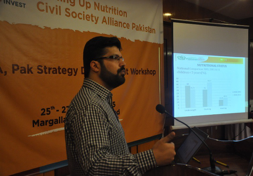 Nutrition is a multi-sectoral challenge and efforts have been made to involve all relevant sectors in the process of scaling up nutrition. At national level, the Ministry of Health Services Regulation and Coordination and the Ministry of National Food Security and Research have been regular members of the Core Group meetings. Other ministries, such as Social Support and Education, are increasingly involved in coordination meetings in order to effect a more multi-sectoral approach to tackling the issue of malnutrition. Provincial policy guidance notes and inter-sectoral strategies include relevant nutrition indicators. The aim is to plan multi-sectorally but to implement sectorally and then evaluate multi-sectorally. It is too early to say if and how this multisector approach is working.
Nutrition is a multi-sectoral challenge and efforts have been made to involve all relevant sectors in the process of scaling up nutrition. At national level, the Ministry of Health Services Regulation and Coordination and the Ministry of National Food Security and Research have been regular members of the Core Group meetings. Other ministries, such as Social Support and Education, are increasingly involved in coordination meetings in order to effect a more multi-sectoral approach to tackling the issue of malnutrition. Provincial policy guidance notes and inter-sectoral strategies include relevant nutrition indicators. The aim is to plan multi-sectorally but to implement sectorally and then evaluate multi-sectorally. It is too early to say if and how this multisector approach is working.
Conclusion and recommendations
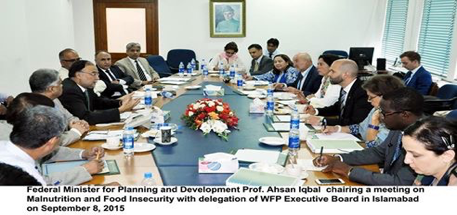 Pakistan has made significant strides towards scaling up nutrition, from generating greater political will to establishing effective coordination mechanisms with all key stakeholders. However, there is some distance to go to achieve the targets set forth in the Pakistan Vision 2025 and international targets for nutrition e.g. World Health Assembly targets, 2nd International Conference on Nutrition, etc.
Pakistan has made significant strides towards scaling up nutrition, from generating greater political will to establishing effective coordination mechanisms with all key stakeholders. However, there is some distance to go to achieve the targets set forth in the Pakistan Vision 2025 and international targets for nutrition e.g. World Health Assembly targets, 2nd International Conference on Nutrition, etc.
We have come to understand that the process is slow and requires patience and teamwork from all stakeholders. Effective programming and implementation, both at national and provincial levels, are essential to achieve the targets. An inclusive approach is key, as is the ability to think ‘outside the box’. Nutrition-sensitive programming is a new concept that is being fostered and early signs are that stakeholders are embracing it. However, continued advocacy, monitoring and evaluation are required to ensure that these efforts are productive.
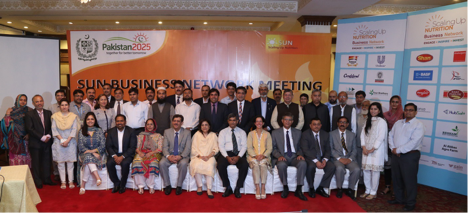 The following are the priorities for Pakistan’s efforts to scale up nutrition programming:
The following are the priorities for Pakistan’s efforts to scale up nutrition programming:
- Ensure that all the sectors are involved in the SUN process;
- Have a National Nutrition Policy and Action Plan in place;
- Effectively monitor and evaluate the programmes and interventions that are implemented under the Action Plan;
- Maintain the current level of political interest in nutrition at the highest possible level;
- Continue budgetary allocations analysis and inclusion of non-public sector financing in this analysis; and
- Monitor utilisation of budgets as an overarching indicator of success.
For more information, email Mr. Aslam Shaheen or Dr. Ali Ahmad Khan


